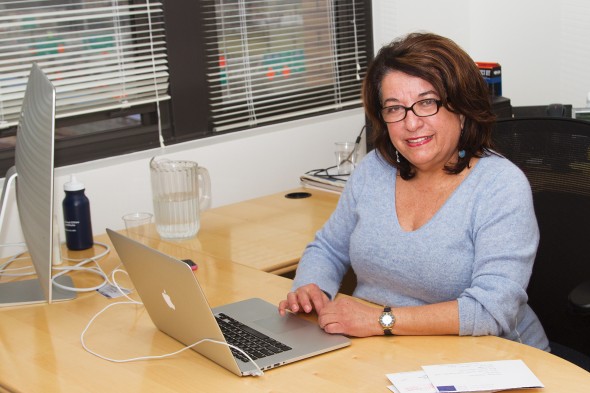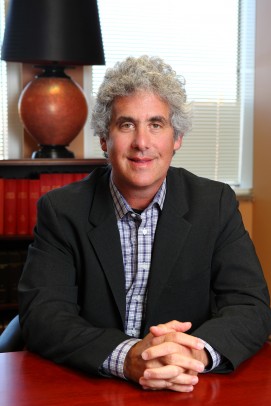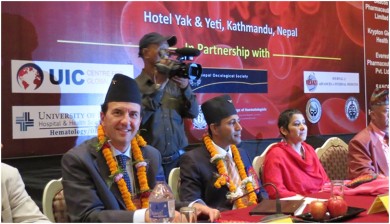East Meets West: Grants fund global health projects

“We are one university, so how can we connect that east and west sides together? Engaging people in collaboration was part of the goal,” says Teresa Córdova, Great Cities Institute director. (Photo: Vibhu S. Rangavasan)
Four multidisciplinary research projects were selected to receive funding this year from the Global Health and Wellbeing Seed Grant program.
The awards, which are designed to assist researchers in analyzing and addressing worldwide health issues, provide $15,000 per selected proposal, for a total budget of $60,000. It’s the third year for the program, created as part of the Chancellor’s Global Excellence Task Force, in collaboration with the UIC College of Medicine’s Center for Global Health and the Great Cities Institute.
“Our overall mission is to support young, emerging global health investigators,” said Stevan Weine, professor of psychiatry and co-director of the program,“to give them the resources they need to take their project to the next level.”

“Our overall mission is to support young, emerging global health investigators,” said Stevan Weine, professor of psychiatry.
The projects range from breaking barriers to health care in Nepal to investigating the ecological significance of Chicago’s gardens. One factor that all four share, however, is that they demonstrate integrative research.
“Every discipline brings a perspective to the table,” said Teresa Córdova, director of the Great Cities Institute and co-director of the Global Health and Wellbeing Seed Grant program. “We thought it was important in this grant to maximize the potential insights and creativity that emerges when you bring people together from different disciplines.”
The cross-disciplinary approach is part of a larger UIC effort to promote campus-wide collaboration.
“One of the things we are looking for is connection between both sides of campus, so that was one purpose,” Córdova said. “We are one university, so how can we connect that east and west sides together? Engaging people in collaboration was part of the goal.”
As for potential impact, Weine and Córdova hope that the assistance blooms into more funding, publications and, eventually, crucial discoveries.
“The idea is for our research to have relevance to addressing real-world problems,” Córdova said. “So the researchers that have been awarded a global seed grant are all addressing critical, critical issues in the various countries where they’re doing research.”
Cultural, ecological significance of Chicago’s urban gardens
Molly Doane is working right in UIC’s backyard. Doane, assistant professor of anthropology, is investigating the role of Chicago’s urban gardens in promoting a sense of wellbeing for low-income, refugee and new immigrant communities in Chicago. She is working in collaboration with Emily Minor, associate professor of biological sciences, Alaka Wali, professor and curator of anthropology, and Joanna Michel, assistant director of the urban medicine program.
“We are particularly interested in how immigrants — whether from the Middle East, Latin America, Chicago suburbs or U.S. South — select and use seeds and plants to support cultural memories, values and identities,” Doane said.
Doane chose Chicago because the city has a diverse immigrant population, is a leader in community gardening and, as a global city, represents larger shifts in policy.
Cost-analysis of cervical cancer screenings in Ethiopia
Gelila Goba, assistant professor of obstetrics and gynecology, founded a study to identify the most effective method for cervical cancer screening in Ethiopia based on evaluation of the national screening program and cost-analysis of alternative screening approaches. Simultaneously, this research will review the Ethiopian Ministry of Health’s five-year National Cancer Control Plan, while comparing four screening modalities against the conclusiveness of a biopsy. Goba and UIC’s Department of Obstetrics and Gynecology is pairing with Kyle Cheek, clinical assistant professor of information and decision sciences, and UIC’s School of Business, along with Mekelle University in northern Tigray, Ethiopia, to conduct a detailed cost and feasibility analysis for the research. Together, they will identify the most cost-effective and efficient method of testing for cervical cancer, the second most common female cancer in Ethiopia.
Barriers to treatment in Nepal
Hematology-oncology professor Damiano Rondelli teamed up with Binay Shah, founder of the Binaytara Foundation and a former hematology-oncology fellow, to explore the development of blood and marrow transplantation in Nepal. During Rondelli’s visits to the country, he noticed the many barriers patients face and determined that he would study the limitations families encounter after being diagnosed with leukemia.
“The overall objective is to address what we believe is one significant problem in all low-middle-income countries, where the growing mortality rate due to cancer represents a global crisis,” Rondelli said.
“Although we cannot solve all the causes for this, access to adequate levels of care is a main determinant of success, and there is very little information on what barriers patients need to overcome.”
Evaluating solar-powered water disinfection devices in Kenya
In order to characterize usage, user perceptions and water quality impacts in Kenya, Samuel Dorevitch, associate professor of environmental and occupational health sciences, is implementing a solar powered disinfection unit.
The device will be installed in 10 homes in Kisumu, Kenya, to provide information on how to make water in the area safer and more reliable.

